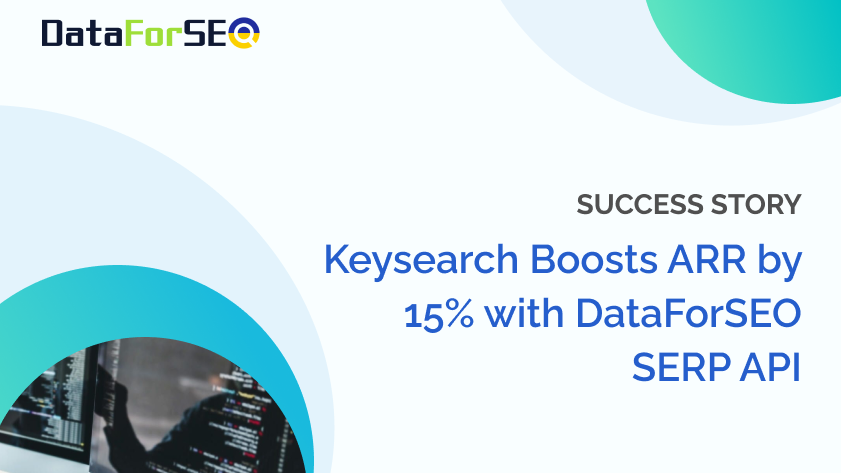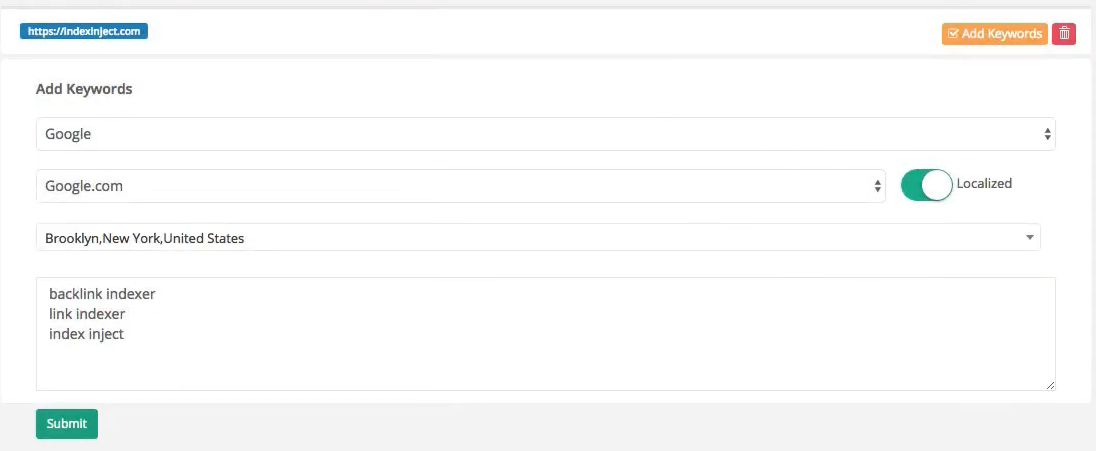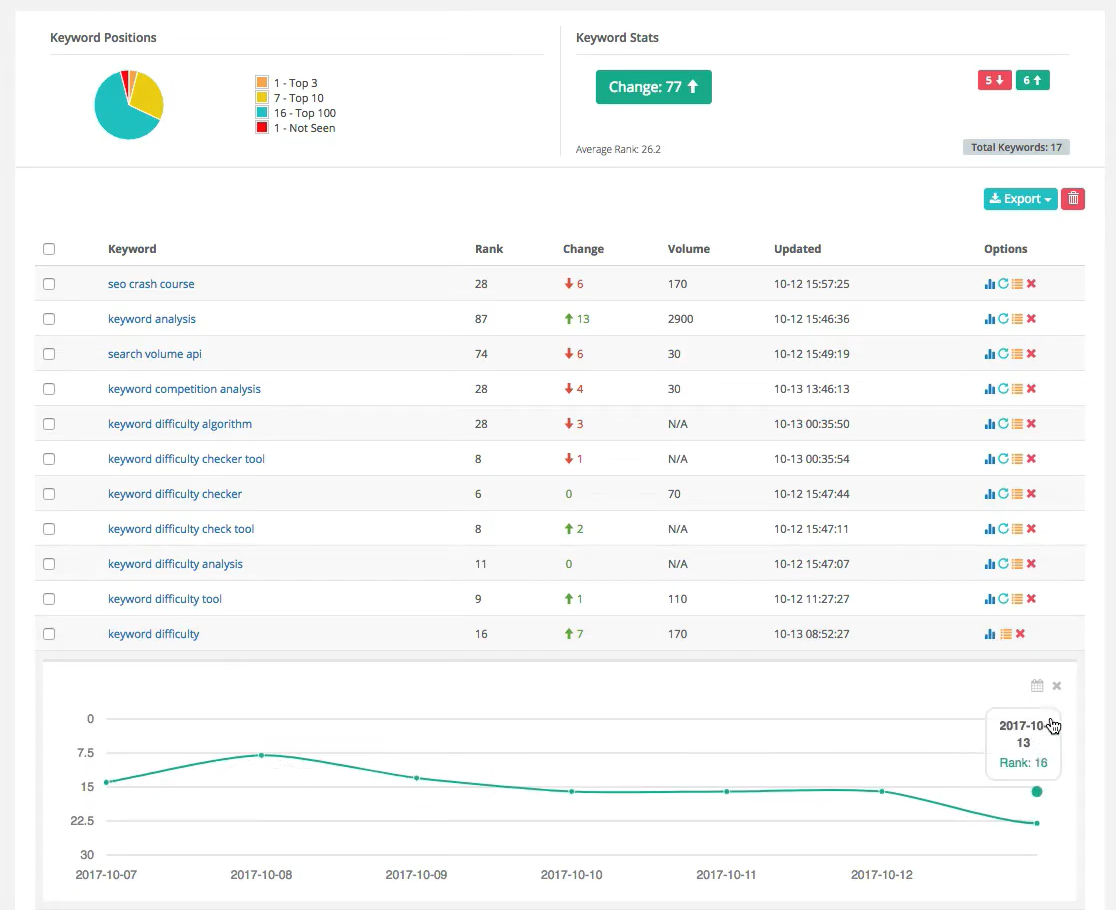
Keysearch Boosts ARR by 15% with DataForSEO SERP API
“By having a solid foundation and predictable costs with SERP API, we were able to expand the rank tracking quotas within our subscription packages. This has given us longer customer retention. On average, customers stayed on for about 6 months and, since we’ve enlarged the quotas, this has expanded to 8 months. This has helped increase our ARR by 15%.”
Dan Pfeffer, Founder & CEO at Keysearch
About Keysearch
Keysearch is primarily a keyword research tool, but it also encompasses a suite of tools for rank tracking, backlink research, and competitive analysis. On top of that, it provides a content writing assistant. The initial keyword research tool was launched in 2016.
Objectives
- Cut rank tracking costs, expand rank tracking limits per package
- Improve system stability and reliability
- Concentrate on feature creation and customer support
Featured Products
SERP API: your one-stop data source of structured SERP data.
- All major search engines, all possible locations
- Advanced SERP features
- Real-time results
About DataForSEO
DataForSEO is the leading provider of SEO data for the marketing technology industry. With an API-led approach to data delivery, DataForSEO is enabling hundreds of software businesses to enhance their products with reliable, accurate, and fresh data.
Background
Keysearch started out as a keyword research tool. The company’s CEO Dan Pfeffer recalls:
“In 2015 when we built Keysearch there were very few web-based keyword research tools on the market. Most were still desktop software that you needed to download. We felt building an affordable web-based option would be highly in demand, and it was!”
Most importantly, it still is. While the web-based SEO software market has become a lot more crowded since 2015, Keysearch has managed to stay a popular tool. They’ve found the right target audience and are ongoingly adapting their software to meet the increasing customer needs. Dan Pfeffer explains:
“Rather than focusing on big SEO agencies, we are geared more towards bloggers and small businesses. We feel we offer a very competitive package compared to the bigger companies like Ahrefs or SEMRush. We don’t claim to be “as good” as those, but we think we give our customers very similar value at a much cheaper price. We focus on the main areas of SEO most needed for the everyday blogger and try to make it simple for them to start achieving some page 1 rankings.”
Speaking of how the team turned Keysearch into a full suite of SEO tools, Dan adds: “The features evolved very naturally. Since we are SEOs ourselves, we just started adding the features we wanted while also listening to what the customers felt would be great additions.
So at first, it was just a keyword research tool, later on, we added rank tracking and Youtube keyword research. Next was adding backlink research and building an organic keyword rankings database for competitive analysis. Once we had all that in place we added our content writing assistant tool, and we have a few other tools we’re hoping to get released later this year.”
The company’s future objective is rather straightforward. “Our goal is to continue to offer a full SEO suite of tools that’s affordable, simple to use, and gives very similar value as the “big boys” in the industry but geared more towards the everyday blogger or small business with no previous SEO experience and a small budget to spend on SEO tools.”
However, as Dan shared, “the main obstacles in the way are getting and housing the vast amount of data needed at a price that works for us and our customers.”
Business Challenge
Before getting to build Keysearch, Dan had already had previous experience with similar projects. “We had built a few other web-based SAAS projects, like link-building tools, blog network management tools, etc. We faced a lot of issues with server load, proxy management, and messy code”, Dan shared.
“With Keysearch we focused on building something from the ground up that would be easier to scale with a focus on internal APIs that would make adding new features easier as we expanded.”
Even though the plan was looking fine, Dan and his team repeated the common mistake made by the starters in the SEO software industry. The thing is, they initially built Keysearch relying on proxy servers for SEO data collection. Sadly, this solution presented numerous limitations to the tool’s development, as is always the case with proxies.
“Before DataForSEO we were using an in-house proxy-based solution. Rank Tracking has always been a thorn in our side due to the amount of monitoring of proxies, google layout changes, etc. This would inhibit us from expanding our rank tracking offerings due to the lack of stability we felt with our in-house system,” Dan told us.
He added: “One night around midnight me (Dan), and our main developer noticed that our rank tracking system had not been updated for hours. We noticed that all of the proxies were banned by Google after years of working fine.”
Besides eliminating data flow disruptions and the complexities associated with maintaining a proxy pool, the team was looking to solve several more problems by that point.
Anticipating Keysearch’s growth, they needed to cut development costs, and allocate more time and resources for feature creation and customer support.
In the following part, we will tell you what saved Dan and the team that night, and how Keysearch managed to hit their goals.
Solution
As Dan and Keysearch’s main developer were witnessing their system being down due to the entirely banned proxy pool, they started looking for immediate solutions.
“That’s when we decided to switch to DataForSEO. Literally, within 3 hours we integrated the entire system and were up and running. The rank tracker was back online around 3-4 am that same night. So integrating the entire system took only a few hours,” Dan told us.
While finding a way out so fast may seem like a miracle, Keysearch’s team has actually researched possible data providers long before that. So, by the night of the proxy system failure, the decision had already been made in favor of DataForSEO.
“Although we knew about DataForSEO for a few years before jumping on, we wanted to wait to see if the company would have longevity before switching some of our systems over. Once it was proven that DataForSEO was going to be around for the long haul we started looking into things further. The most important factor for us was reliability and of course, cost,” Dan shared.
He added: “DataForSEO has relieved a huge amount of stress for us, mainly in terms of Rank Tracking and SERP collection. In addition to cutting our costs in half for Rank Tracking, it gives us peace of mind that we have the data we need when we need it.
This allows us to concentrate on feature creation and customer support rather than data collection. I can’t stress enough how important peace of mind is, and how much time we’ve saved using DataForSEO. It’s not just cost.”

Indeed, since the Keysearch team integrated DataForSEO SERP API, they’ve made some significant improvements to the tool. To begin with, they’ve added localized rank tracking.
On top of that, the team has made some UI changes. Here’s what Keysearch’s Rank Tracker started to look like since then.

Most importantly, Dan says, “having a solid foundation and predictable costs with DataForSEO, we were able to expand the rank tracking quotas within our subscription packages. This has given us longer customer retention. On average, customers stayed on for about 6 months and, since we’ve enlarged the quotas, this has expanded to 8 months. This has helped increase our ARR by 15%.”
Dan also shared new ideas: “We haven’t yet based anything solely on DataForSEO but we do plan to do that in the future. We’re preparing to build a New Site Audit around DataForSEO and SERP History integration.”
Dan added: “We couldn’t be happier with DataForSEO. There’s always somebody available, resolution of any issues is fast, rarely taking more than a few hours and new feature requests are always listened to. As a company that requires constant uptime, this was exactly the type of support we needed.”
In Dan’s opinion, the main benefits of using DataForSEO APIs for Keysearch are:
- Reliability
- Not having to worry about data collection
- Being able to easily price out what new features will cost due to the consistent pricing.


